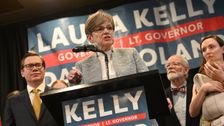
A new poll from the nation’s largest teachers union uncovered that lifestyle-war assaults on community universities mostly fell flat in the 2022 midterm elections, proving significantly less essential to voters than worries about faculty shootings and standard problems more than school funding.
The findings aid reveal why a quantity of Democratic governors and gubernatorial candidates ― together with Wisconsin Gov. Tony Evers, Kansas Gov. Laura Kelly and Arizona Gov.-elect Katie Hobbs ― have been able to efficiently fight off conservative Republicans who built the therapy of transgender pupils, and the beforehand obscure academic framework regarded as critical race idea, into popular problems in their races.
“A large, large quantity of time and money was invested in CRT by conservative politicians and media,” said Margie Omero, a pollster at the Democratic business GBAO Procedures who executed the survey for the Nationwide Education Affiliation. “Voters rejected what Republicans had been offering, and their makes an attempt to make a wedge problem on community schools.”
In Wisconsin, Evers properly portrayed GOP Gov. Tim Michels’ guidance for college option as a risk to general public universities. In Kansas, Kelly fought off a number of adverts attacking her veto of legislation to bar transgender learners from competing in sports activities aligned with their gender identification. In Michigan, Gov. Gretchen Whitmer was ready to shrug off ads suggesting that educational facilities have been extra centered on a “woke” agenda than on reading through, crafting and arithmetic.
Republicans to start with turn out to be excited about the electoral efficiency of tradition-war attacks for the duration of the 2021 Virginia governor’s race, when a host of education-related controversies ― such as no matter whether universities in the state taught essential race theory, a key suburban university district’s mishandling of sexual assault cases, pandemic-period closures and Democratic nominee Terry McAuliffe downplaying of the job of moms and dads in training ― aided now-Gov. Glenn Youngkin win.
But the precise role of vital race concept in Youngkin’s earn was up for debate among the political analysts. And even just before the 2022 midterms, there have been distinct indicators the GOP was battling to transform the education culture wars into a winning situation. Just 1.7% of Republican ads talked about CRT, in accordance to the Wesleyan Media Venture. A September memo from the Republican Nationwide Committee explained to GOP strategies they required to connect society war challenges to present voter concerns, like pandemic-era studying loss.
The survey located that a full 3-fifths of midterm voters claimed faculty shootings have been a key aspect in their vote, extra than any other instruction issue.
Voters put considerably less importance on correct-wing culture war subject areas. Forty-3 p.c had been anxious about educational institutions training significant race theory to be “politically proper,” when 42% said they nervous about indoctrination from “radical remaining-wing academics.”
By comparison, voters had been notably far more involved about reserve bans and conservative attempts to censor history. Fifty-5 p.c claimed a main concern for them was pupils “not finding a total, genuine historical past of our place,” and an identical proportion expressed worry about “too numerous politicians … banning textbooks or topics that don’t align with their individual beliefs, like Martin Luther King, Jr., Rosa Parks, and the Holocaust.”
The conclusions reflect that although the idea of important race theory fired up Republican base voters, it did not substantially move persuadable voters in 2022. “Culture war concerns do not resonate with impartial voters a great deal at all,” the poll bluntly states.
Voters also had additional practical and classic worries about training funding and understanding. Fifty-5 % reported universities failing to get enough funding was a big issue, even though 54% stated the same about pandemic-period learning reduction and about low instructor salaries leading to a staffing lack at colleges.
In addition, the poll observed that a rather very low percentage of voters have been animated by faculty selection issues. Just 38% of voters mentioned faculty vouchers using cash from public faculties was a major factor in their vote, and only 29% claimed the deficiency of college selection possibilities for dad and mom was a significant element.
The poll also located that the public however has good sights of general public educational institutions and instructors. Fifty-7 percent stated they have a favorable viewpoint of K-12 colleges in their neighborhood, with just 18% holding an unfavorable viewpoint. Practically two-thirds have a favorable opinion of academics, with just 15% holding a destructive impression.
Notably, really handful of voters look at on their own in political opposition to instructors. Sixty-two percent of voters claimed they are aligned with instructors on general public instruction issues, while only 17% claimed they are opposed. Even amongst Republicans, a 39% plurality of voters claimed they are aligned with teachers, in comparison to 34% who are opposed.
There are even now indicators that Democrats have not thoroughly regained the edge they experienced on instruction concerns before the pandemic, with a variety of pre-election surveys exhibiting them with a scaled-down edge than would be normal. Some effective GOP campaigns, together with the reelection effort of Gov. Brian Kemp (R-Ga.), attacked their Democratic opponents for supporting pandemic-period school closures.
GBAO carried out the poll from Nov. 10 to Nov. 19 by using landlines and cellphones, surveying 1,200 voters who forged a ballot in the midterms. The margin of error on the poll is furthermore or minus 2.8 share points.




